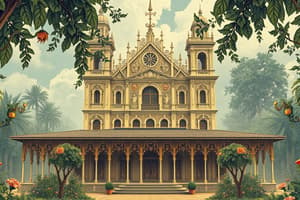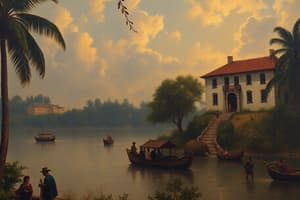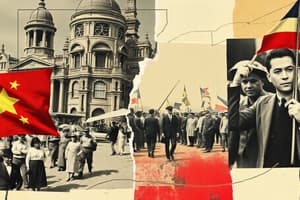Podcast
Questions and Answers
What was the origin of the term 'Barangay'?
What was the origin of the term 'Barangay'?
- From the name of a Maharlika
- From the word 'balangai' (correct)
- From the word 'baranggay'
- From the name of a Datu
How did a Datu obtain his position in a Barangay?
How did a Datu obtain his position in a Barangay?
- Through a lottery system
- Through appointment by a higher authority
- Through inheritance, wealth, wisdom or strength (correct)
- Through election by the people
What was similar between the powers of a Datu and a monarch in Western Europe?
What was similar between the powers of a Datu and a monarch in Western Europe?
- Their military strength
- Their titles and ranks
- Their powers as Chief Executive, Legislator, Judge, and Military Commander (correct)
- Their system of government
What was the relationship like among the independent Barangays?
What was the relationship like among the independent Barangays?
What was the social class composed of people who were born free and emancipated slaves called?
What was the social class composed of people who were born free and emancipated slaves called?
What was the title of a noblewoman in a Barangay?
What was the title of a noblewoman in a Barangay?
What is the name of the oldest existing school for girls in the Philippines?
What is the name of the oldest existing school for girls in the Philippines?
What was introduced by the Spanish to make our people closer to the Western World?
What was introduced by the Spanish to make our people closer to the Western World?
Who is known as the Prince of Filipino Printers?
Who is known as the Prince of Filipino Printers?
What is the name of the first book printed in the Philippines?
What is the name of the first book printed in the Philippines?
What did the Spanish develop and preserve in the Philippines?
What did the Spanish develop and preserve in the Philippines?
Who introduced a new calendar and gave Spanish names to Filipinos?
Who introduced a new calendar and gave Spanish names to Filipinos?
What is the name of the special court conducted by the incoming governor-general to investigate the conduct of the outgoing governor-general?
What is the name of the special court conducted by the incoming governor-general to investigate the conduct of the outgoing governor-general?
Which of the following is a collection of ancient Spanish laws?
Which of the following is a collection of ancient Spanish laws?
What is the main purpose of the 'Las Leyes de Toro'?
What is the main purpose of the 'Las Leyes de Toro'?
What is the significance of Catholicism in the Philippines according to the text?
What is the significance of Catholicism in the Philippines according to the text?
What is the primary function of the 'Visitador'?
What is the primary function of the 'Visitador'?
How many Christian nations are there in Asia according to the text?
How many Christian nations are there in Asia according to the text?
What was the name given to the country formed by grouping together the islands?
What was the name given to the country formed by grouping together the islands?
Who was the legendary lawgiver of the people?
Who was the legendary lawgiver of the people?
What were the three main aims of Spanish colonization?
What were the three main aims of Spanish colonization?
Who was the Chief Executive of the Philippines during the Spanish Period?
Who was the Chief Executive of the Philippines during the Spanish Period?
What was the Supreme Court of the Philippines during the Spanish Period?
What was the Supreme Court of the Philippines during the Spanish Period?
Where was the official residence of the Governor-General located?
Where was the official residence of the Governor-General located?
What is Francisco Balagtas known as?
What is Francisco Balagtas known as?
What is the name of the bamboo organ built by Father Diego Cerra?
What is the name of the bamboo organ built by Father Diego Cerra?
What is the name of the painting by Juan Luna?
What is the name of the painting by Juan Luna?
What is the name of the type of play that features fights between Christians and Muslims?
What is the name of the type of play that features fights between Christians and Muslims?
What is the name of the observatory founded in 1865?
What is the name of the observatory founded in 1865?
Who is the 'Father of Filipino Painters'?
Who is the 'Father of Filipino Painters'?
Study Notes
Pre-Colonial Era of the Philippines
- The ancestors of the Filipinos already had a government before the coming of the Spaniards in the 15th century.
- The basic unit of government was the barangay, which came from the word "balangai" and consisted of 30 or more families.
- There was no national government, and the independent barangays had relations of war and peace among themselves.
Datu or Raja
- The datu was the ruler of the barangay, and obtained his position through inheritance, wealth, wisdom, or strength.
- The powers of the datu were similar to those of a monarch in Western Europe, including being the chief executive, legislator, judge, and military commander.
Social Classes in a Barangay
- The nobles, known as Maharlika, constituted the ruling class or barangay elite.
- Titles of nobility included Datu, Raja, Lakan, Lakambini, Gat, and Dayang.
- The freemen, known as Timawa, consisted of persons born as free and emancipated slaves.
Filipino Society During the Spanish Era
- Hospitals and orphanages were established, including the Hospital of San Juan de Dios and San Lazaro Hospital.
- The diet of the Filipinos was introduced to new foods such as beef, mutton, sausages, ham, and sardines, as well as European wines and spirits.
- Men and women adopted Western-style clothing, such as coats and trousers for men, and saya and camisa for women.
- Family life was improved, and women's status in society was elevated.
Education and Culture
- The University of Sto. Tomas (1611) and Colegio de Sta. Isabel (the oldest existing school for girls) were established.
- The Latin alphabet and Spanish language were introduced, making the Filipinos closer to the Western World.
- The printing press was introduced, with the first book printed in the Philippines being the Doctrina Christiana (1595).
- Literature flourished, with notable works including the Pasión, Awit, and Corrido.
Spanish Laws and Governance
- The Spanish laws extended to the Philippines, including the Leyes de Indias, Las Siete Partidas, La Novisima Recopilación, Las Leyes de Toro, Penal Code, Civil Code, Code of Commerce, Mining Law, and Mortgage Law.
- The Spanish Governor-General was the chief executive of the Philippines, with powers including executive, administrative, legislative, judicial, diplomatic, military, and ecclesiastical.
- Checks to the Governor-General's powers included the Royal Audiencia, the Supreme Court of the Philippines during the Spanish Period.
Theater, Music, and Art
- The Cenaculo and Moro-moro were popular forms of theater.
- Music was enriched by the introduction of Western instruments, songs, and dances.
- The Las Piñas Bamboo Organ (1818) was built by Father Diego Cerra.
- Notable artists included Damian Domingo, Juan Luna, and Felix Resurreción Hidalgo.
Science and Fiestas
- The Observatory of Manila was founded in 1865, with Father Federico Faura as its first director.
- Notable scientists included Anacleto V. Del Rosario, Leon Ma. Guerrero, and José Rizal.
- Fiestas and religious occasions, such as Santacruzan and Flores De Mayo, were introduced by the Spaniards.
- Amusements such as cock-fighting, Manila Lottery, and horse-racing were also introduced.
Studying That Suits You
Use AI to generate personalized quizzes and flashcards to suit your learning preferences.
Description
Learn about the government and social structure of the Philippines before the arrival of the Spanish in the 15th century. Discover the role of the Datu and the significance of the Barangay in this early period of Philippine history.




